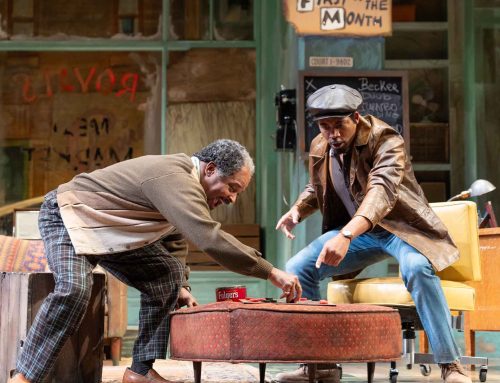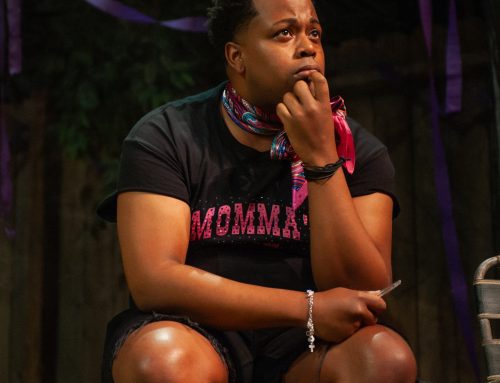
at the Oregon Shakespeare Festival
opening performance, February 23, 2008
The opening of Fences revealed a shaky story shakily told.
I assume that it’s the script which has inconsistencies and false starts that Oregon Shakespeare merely brought forward. Certainly this production didn’t weave together a clear or consistent or entertaining storyline from whatever August Wilson wrote.
To begin, various cast members stumbled over lines at least a half dozen times. Blowing lines in an obvious way is my personal pet peeve; it always jars me out of the moment. And, these Fences characters had tongue-tie-itis, especially the actors who appeared on stage early in the narrative.
It wasn’t just the lines that missed. The direction, characters, sound, and lighting didn’t fit quite right.
Director Leah Gardiner amped everyone’s energy up one or two notches above reasonable. Words exploded at odd moments.
In addition, Gardiner put me off with the playbill blurb:
“In 1957, when this play begins, nine black students, protected by federal troops, desegregated Central High School in Little Rock, Arkansas. Throughout the country, Black Americans, although aware that change was inevitable, continued to live segregated lives.”
What? Inevitable? Really, the country should have just sat back and waited then, eh? How young is this director? How clueless?
On to the costumes: One scene opens with the mother on her porch listening to a baseball game on the radio. She and the husband appeared in wool caps and winter clothes. Were they playing baseball in winter? Is there some symbolism there that August Wilson wrote into the script? Or, was the costume designer just not paying attention? I don’t know — there just weren’t enough clues to go on. Similarly, some days Pop comes home from work wearing unmatched clothes while his co-worker friend is always in a uniform. Symbolism? Attention deficit disorder?
Charles Robinson as the father (Troy Maxson) delivered some fine speeches. Several, in fact. But together they didn’t create a character for me. Worse, there were more troubling inconsistencies. In many Friday-afternoon after-work scenes, Pop is drinking gin and holding forth. After awhile, he starts getting more grandiose and sways on his feet. Fine. He’s getting drunk. So then, why does Robinson start swaying on his feet during a before-work argument scene? Pop has excused his Friday afternoon binges by saying that’s his only time of the week to drink, and his job at the time of the morning scene is driving a truck. Does Pop go to work drunk, or does Robinson always sway? I don’t know — there just weren’t enough clues to go on.
G. Valmont Thomas plays a mentally damaged relative, Gabriel. This Gabriel is upbeat and exuberant, and played in a style left over from Thomas’ 2007 performance in On the Razzle. His eyes are always alive, and he’s purposeful not pathetic. It took me quite a while to figure out that Gabriel was not just pretending to be crazy.
I also couldn’t figure out Shona Tucker as the mother, starting from the way she looked in the first scene. Most of the time she reminded me of a Carol Burnett dressed for one of her comedy sketches. Except without the humor. Maybe she paid attention to the audience rather than another character on stage. I don’t know, I just felt distracted by something in her performance.
Kevin Kenerly as Lyons, Cameron Knight as the son (Corey), and whichever of the two young girls I saw as Raynell presented their characters clearly and consistently. Thank goodness that OSF cast Kenerly in an age-appropriate role instead of shoehorning him into being “the young son”. That role was played just fine by Knight.
The blocking was thoughtless. For considerable stretches an actor with their back to me kept me from seeing other characters on the stage. I was in Seat A20 — if you get near there, try to switch.
I noticed the light changes. Not in a good way.
The music was more than blues/jazz. There was a strain of mysticism that felt left over from Gem of the Ocean. It didn’t work.
Finally, the play itself is another August Wilson play which I feel is more universal than just speaking to the American American experience. The ramrod drunken father was a character in my lily-white home life. If the play is mostly about the family relationships, then wouldn’t it be a candidate for color-blind casting while another play served as the 2008 African American play?
I want to see all of August Wilson’s plays. The best part of this production is that I can check Fences off the list.
Ozdachs rating:  .
.
(A softening note: when I saw Gem last year, I gave it only 3 stars. Friends educated me on its subtleties and when I saw it again in August, I was standing with the crowd at the curtain call.)





Re: Don’t Give Up On Fences
Thanks!
We were debating at dinner tonight whether it was the play or the production. I appreciate your weighing in!
Of course, I’d pay to see Avery Books read the telephone book.